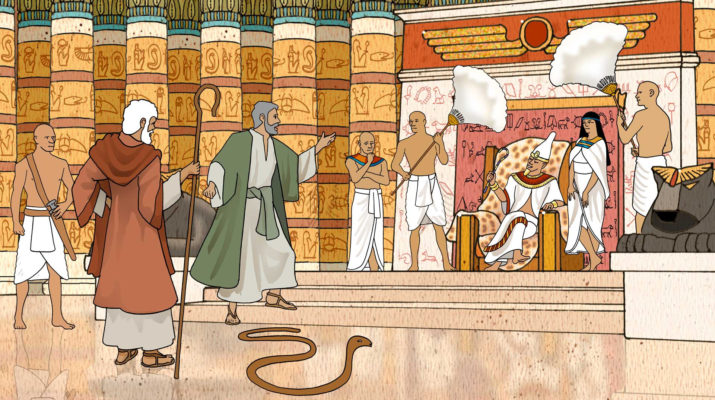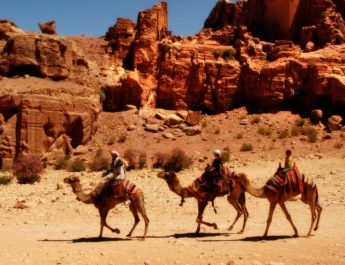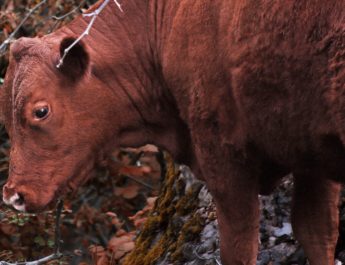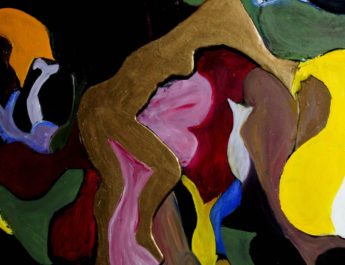Exodus 7
BibleHub
1 The LordI said to Moses,II “See,III I have madeIV you like GodV to Pharaoh,VI
Notes on verse 1a
I “Lord” = YHVH. From havah (to be, become) or hayah (to come to pass, become, be). This is the name of the God of Israel, the self-existent and eternal one, the tetragrammaton. This pronunciation has been lost to time so “Lord” is generally used in its place.
II “Moses” = Mosheh. From mashah (to pull out in a literal or figurative sense, to draw out) OR from Egyptian mes or mesu (child, son i.e. child of…). This is Moses – the one drawn out from the water, which is to say, rescued. If derived from the Egyptian, his name would share a root with Rameses and Thutmose.
III “see” = raah. This is to see in a literal or figurative sense so stare, advise, think, view.
IV “made” = natan. This is to give, put, set, offer. It is to give literally or figuratively.
V “God” = Elohim.
VI “Pharaoh” = Paroh. From Egyptian pr (palace, pharaoh; literally house + great). This is Pharaoh, a title for Egyptian kings. See https://en.wiktionary.org/wiki/pharaoh
and your brotherVII AaronVIII shall beIX your prophet.X
Notes on verse 1b
VII “brother” = ach. This is brother, kindred, another, other, like. It is literally brother, but it can also be someone who is similar, resembling, or related to.
VIII “Aaron” = Aharon. Derivation uncertain. May mean “bearer of martyrs” OR be related to Ancient Egyptian ꜥḥꜣ rw (warrior lion) OR elevated, exalted, high mountain. This is Aaron. See https://en.wiktionary.org/wiki/Aaron
IX “be” = hayah. Related to “Lord” in v1. See note I above.
X “prophet” = nabi. This is prophet, prophecy, speaker, or someone inspired.
2 You shall speakXI allXII that I commandXIII you, and your brother Aaron shall tellXIV Pharaoh to let the IsraelitesXV goXVI out of his land.XVII
Notes on verse 2
XI “speak” = dabar. This is generally to speak, answer, declare, or command. It might mean to arrange and so to speak in a figurative sense as arranging words.
XII “all” = kol. This is all or every.
XIII “command” = tsavah. This is to charge, command, order, appoint, or enjoin. This is the root that the Hebrew word for “commandment” comes from (mitsvah).
XIV “tell” = dabar. Same as “speak” in v2. See note XI above.
XV “Israelites” = ben + Yisrael. Literally, “children of Israel.” Ben is from banah (to build or obtain children). This is son, age, child. It is son in a literal or figurative sense. Yisrael is from sarah (to persist, exert oneself, contend, persevere, wrestle, prevail) + el (God or god). This is Israel, meaning God strives or one who strives with God; new name for Jacob and for his offspring. This refers to the people and to the land.
XVI “let…go” = shalach. This is to send out, away, send for, forsake. It can also mean to divorce or set a slave free.
XVII “land” = erets. Root may mean to be firm. This is earth, ground, field land, or country.
3 But I will hardenXVIII Pharaoh’s heart,XIX and I will multiplyXX my signsXXI and wondersXXII in the land of Egypt.XXIII
Notes on verse 3
XVIII “harden” = qashah. This is to be fierce, cruel, dense, tough, severe.
XIX “heart” = leb. May be related to labab (to encourage; properly, to be encased as with fat; used in a good sense, this means to transport someone with love; used in a bad sense, it can mean to dull one’s senses). This is the heart, courage, one’s inner self, the mind, or the will. Heart is only used in a figurative sense in the Old and New Testaments.
XX “multiply” = rabah. This is increasing in any aspect whether quantity, authority, size, quality, greatness, etc.
XXI “signs” = oth. From avah (to mark, sign, point out); OR from uth (to agree). This is a sign in a literal or figurative sense. It could be a flag or monument. It could be evidence or a mark. It could also be an omen or a miracle.
XXII “wonders” = mopheth. Perhaps from yaphah (to be beautiful, decorate; root means being bright, which implies being beautiful). This is a wonder, miracle, symbol, sign, or omen.
XXIII “Egypt” = Mitsrayim. Perhaps from matsor (besieged or fortified place, bulwark, entrenchment; something hemmed in; a siege or distress or fastness); from tsur (to confine, besiege, to cramp). This is Egypt.
4 When Pharaoh does not listenXXIV to you, I will layXXV my handXXVI upon Egypt and bringXXVII my peopleXXVIII the Israelites,
Notes on verse 4a
XXIV “listen” = shama. This is to hear, call, consent, or consider. It implies listening intelligently, giving attention, and, because of these two factors, obedience and action are often implied.
XXV “lay” = natan. Same as “made” in v1. See note IV above.
XXVI “hand” = yad. This is hand, ability, power. Hand in a literal sense, but also what one can do or the means by which one does it.
XXVII “bring” = yatsa. This is to go or come out, bring forth, appear. It is to go out in a literal or figurative sense.
XXVIII “people” = am. From amam (to darken, hide, associate; creating shadows by huddling together). This is people or nation. It can be used specifically for a tribe, collectively of troops or armies, or figuratively to refer to a flock of animals.
companyXXIX by company, out of the land of Egypt by greatXXX acts of judgment.XXXI
Notes on verse 4b
XXIX “company” = tsaba. From tsaba (to wage war, serve, assemble, fight, perform, muster, wait on). This is a large group of persons (used figuratively for a group of things). It implies a campaign literally as with army, war, warfare, battle, company, soldiers. Can also be used figuratively for hardship or for worship.
XXX “great” = gadol. From gadal (to grow up, become great, become wealthy – to advance. The root meaning may be to twist in the sense of the process of growing). This is great, high, bigger, noble, old, marvelous. It can also refer to someone who is powerful or distinguished.
XXXI “acts of judgment” = shephet. 16x in OT. From shaphat (to judge, defend, pronounce judgment, condemn, govern). This is a judgment or a sentence.
5 The EgyptiansXXXII shall knowXXXIII that I am the Lord, when I stretch outXXXIV my hand against Egypt and bring the Israelites out from amongXXXV them.”
Notes on verse 5
XXXII “Egyptians” = Mitsri. Related to “Egypt” in v3. From the same as Mitsrayim (see note XXIII above). This is Egyptian.
XXXIII “know” = yada. This is to know, acknowledge, advise, answer, be aware, be acquainted with. Properly, this is to figure something out by seeing. It includes ideas of observation, recognition, and care about something. It can be used causatively for instruction, designation, and punishment.
XXXIV “stretch out” = natah. This is to stretch or spread out, to extend, or bend. In can also imply moral deflection.
XXXV “among” = tavek. This is among, middle, in the midst, the center. Perhaps, properly, to sever.
6 Moses and Aaron didXXXVI so;XXXVII they did just as the Lord commanded them. 7 Moses was eightyXXXVIII yearsXXXIX oldXLand AaronXLI eighty-threeXLII, XLIII when they spoke to Pharaoh.
Notes on verses 6-7
XXXVI “did” = asah. This is to make, do, act, appoint, become in many senses.
XXXVII “so” = ken. Perhaps from kun (properly, in a perpendicular position; literally, to establish, fix, fasten, prepare; figuratively, it is certainty, to be firm, faithfulness, render sure or prosperous). This is to set upright. Generally used figuratively to mean thus, so, afterwards, rightly so.
XXXVIII “eighty” = shemonim. From the same as shemoneh (eight or eighth; abundance as being more than 7, the number of sacred fullness); perhaps from shamen (to shine, which implies being oily, growing fat); from shaman (to grow fat, shine, be oily). This is eighty.
XXXIX “years” = shanah. From shana (to change, alter). This is a year, age, old. It can also mean yearly.
XL “old” = ben. Same as “Israelites” in v2. See note XV above.
XLI {untranslated} = ben. Same as “Israelites” in v2. See note XV above.
XLII “three” = shalosh. This is three, fork, three times.
XLIII {untranslated} = shanah. Same as “years” in v7. See note XXXIX above.
8 The Lord said to Moses and Aaron, 9 “When Pharaoh says to you, ‘PerformXLIV a wonder,’ then you shall say to Aaron, ‘TakeXLV your staffXLVI and throw it downXLVII beforeXLVIII Pharaoh, and it will becomeXLIX a snake.’”L
Notes on verses 8-9
XLIV “perform” = natan. Same as “made” in v1. See note IV above.
XLV “take” = laqach. This is to take, accept, carry away, receive. It can also have the sense of take a wife or take in marriage.
XLVI “staff” = matteh. Related to “stretch out” in v5. From natah (see note XXXIV above). This is a staff, rod, branch, or tribe. It could be a rod for discipline or correction. It could be a scepter to indicate authority, a throwing lance, or a walking staff. Figuratively, it could also be something that supports life (like bread).
XLVII “throw…down” = shalak. This is to throw, fling, or hurl. It can also be to throw away in a literal or figurative sense.
XLVIII “before” = paneh. From panah (to turn, face, appear). This is face in a literal or figurative sense. It could be face, presence, anger, respect. It can also be used of God to indicate divine favor or presence.
XLIX “become” = hayah. Same as “be” in v1. See note IX above.
L “snake” = tannin. From the same as tan (jackal, dragon, whale). It may stem from a root meaning elongate. It is some kind of monster of land or sea like a jackal or a sea serpent.
10 So Moses and Aaron wentLI to Pharaoh and didLII as the Lord had commanded; Aaron threw down his staff beforeLIII Pharaoh and his officials,LIV and it became a snake.
Notes on verse 10
LI “went” = bo. This is to enter, come in, advance, fulfill, bring offerings, enter to worship, attack. It can also have a sexual connotation.
LII {untranslated} = ken. Same as “so” in v6. See note XXXVII above.
LIII “before” = paneh. Same as “before” in v9. See note XLVIII above.
LIV “officials” = ebed. From abad (to work, serve, compel; any kind of work; used causatively, can mean to enslave or keep in bondage). This is a servant, slave, or bondservant.
11 Then Pharaoh summonedLV the wise menLVI and the sorcerers;LVII and they also, the magiciansLVIII of Egypt, did the sameLIX by their secret arts.LX
Notes on verse 11
LV “summoned” = qara. This is to call or call out – to call someone by name. Also used more broadly for calling forth.
LVI “wise men” = chakam. From chakam (to be wise or teach wisdom; this is wisdom in thought, word, or action). This is wise, skillful, cunning, or artful.
LVII “sorcerers” = kashaph. 6x in OT. From kesheph (sorcery, magic). This is doing sorcery, using magic, reciting a spell.
LVIII “magicians” = chartom. 11x in OT. From the same as cheret (any kind of tool used for engraving – a stylus, chisel, or pen). This is an engraver or magician. It is someone who knows how to do occult things, so it could be a diviner or someone who does horoscopes. In the Bible, magicians interpret dreams (in Genesis and Daniel) and are also called on in Exodus to disprove or duplicate the miracles of God.
LIX “same” = ken. Same as “so” in v6. See note XXXVII above.
LX “secret arts” = lahat. 2x in OT– of the cherubim’s flaming sword in Genesis 3:24 & the secret arts performed by Pharaoh’s sorcerers in Exodus 7:11. From lahat (to burn, kindle, consume, lick up, blaze). This is flaming, blaze, enchantment.
12 Each oneLXI threw down his staff, and they became snakes; but Aaron’s staff swallowed upLXII theirs. 13 Still Pharaoh’s heart was hardened,LXIII and he would not listen to them, as the Lord had said.
Notes on verses 12-13
LXI “each one” = ish. Perhaps from enosh (human, humankind, mortal); from anash (to be weak, sick, or frail). This is man, husband, another, or humankind.
LXII “swallowed up” = bala. This is to swallow, engulf, cover, or destroy.
LXIII “hardened” = chazaq. This is to strengthen, seize, be courageous, repair, bind, heal, conquer, harden.
14 Then the Lord said to Moses, “Pharaoh’s heart is hardened;LXIV he refuses to let the people go. 15 GoLXV to Pharaoh in the morning,LXVI asLXVII he is going outLXVIII to the water;LXIX
Notes on verses 14-15a
LXIV “hardened” = kabed. From kabad (to be heavy, weighty, burdensome). This is heavy, grievous, sore. It can also be weighty in the sense of gravitas. The word for “glory” in Hebrew comes from this root (kabod).
LXV “go” = halak. This is go, come, walk. It is walk literally and figuratively and includes people and animals. It can be used figuratively for one’s moral life – how we walk according to God’s way or against it. It can also refer to the walk of life as in the course one’s life takes, the choices we make, etc.
LXVI “morning” = boqer. From baqar (to seek, plow, break forth, admire, care for). This refers to the break of day. So it is dawn, early, morning, or morrow.
LXVII “as” = hinneh. From hen (lo! Behold! If, though; an expression of surprise). This is to draw attention, show suddenness or surprise, or to emphasize the importance of the coming statement. See! Lo! Behold!
LXVIII “going out” = yatsa. Same as “bring” in v4. See note XXVII above.
LXIX “water” = mayim. This is water, waters, or waterway in a general sense. Figuratively, it can also mean juice, urine, or semen.
standLXX by at the riverLXXI bankLXXII to meetLXXIII him, and take in your hand the staff that was turnedLXXIV into a snake.LXXV
Notes on verse 15b
LXX “stand” = natsab. This is to station, appoint, establish, take a stand.
LXXI “river” = yeor. From Egyptian yeor (river). This is the Nile as the main river in Egypt. It is also used for the Tigris for its similar status in Assyria. It can also more generally mean river, steam, channel, or flood.
LXXII “bank” = saphah. This is lip, edge, border, bank – used for a boundary. It can also be speech or language.
LXXIII “meet” = qirah. Related to “summoned” in v11. From the same as qara (see note LV above). This is any kind of encounter, whether peaceful, hostile, or incidental. It can also mean help or seek.
LXXIV “turned” = haphak. This is to turn, overturn, change, return, turn over, pervert.
LXXV “snake” = nachash. Perhaps from nachash (to practice divination, learn by experience; to hiss as in whispering a spell). This is a serpent or snake. Used for the Serpent in the garden of Eden.
16 Say to him, ‘The Lord, the God of the Hebrews,LXXVI sentLXXVII me to you to say, “Let my people go,LXXVIII so that they may worshipLXXIX me in the wilderness.”LXXX ButLXXXI until now you have not listened.
Notes on verse 16
LXXVI “Hebrews” = Ibri. From Eber (the region beyond; Eber, the name of several Israelites including a descendant of Shem); from abar (to pass over, pass through, or pass by; cross over or to alienate; used for transitions). This is Hebrew, perhaps meaning a descendant of Eber.
LXXVII “sent” = shalach. Same as “let…go” in v2. See note XVI above.
LXXVIII “let…go” = shalach. Same as “let…go” in v2. See note XVI above.
LXXIX “worship” = abad. Related to “officials” in v10. See note LIV above.
LXXX “wilderness” = midbar. Related to “speak” in v2. From dabar (see note XI above). This is mouth or speech. It can also be desert or wilderness. Additionally, it can be used for a pasture to which one drives cattle.
LXXXI {untranslated} = hinneh. Same as “as” in v15. See note LXVII above.
17 Thus says the Lord, “By this you shall know that I am the Lord.” See,LXXXII with the staff that is in my hand I will strikeLXXXIII the water that is in the Nile,LXXXIV and it shall be turned to blood.LXXXV
Notes on verse 17
LXXXII “see” = hinneh. Same as “as” in v15. See note LXVII above.
LXXXIII “strike” = nakah. This is to hit whether lightly or severely. It can be used in a literal or figurative sense. So, this could be beat, punish, give wounds, kill, or slaughter.
LXXXIV “Nile” = Yeor. Same as “river” in v15. See note LXXI above.
LXXXV “blood” = dam. Perhaps from damam (to cease, be or become mute, silent, still, cut off, hold peace, be astonished, die). This is blood, bloodshed, bloodguilt, lifeblood, and death. It is used for people and animals. More often blood from a wound or the blood of the innocent. Used figuratively for violence or for wine. Closely tied to life and death.
18 The fishLXXXVI in the river shall die,LXXXVII the river itself shall stink,LXXXVIII and the Egyptians shall be unableLXXXIX to drinkXC water from the Nile.’”
Notes on verse 18
LXXXVI “fish” = dagah. 15x in OT. From dag (fish, fishing); perhaps from da’ag (to fear, be worried, sorrow, be concerned, be anxious, be sorry). This is fish – perhaps as creatures that move by squirming.
LXXXVII “die” = mut. This is to die in a literal or figurative sense. It can also refer to being a dead body.
LXXXVIII “stink” = baash. 18x in OT. This is to stink or be foul. Figuratively, it can refer to offensive behavior – morally odious or loathsome.
LXXXIX “be unable” = laah. 19x in OT. This is to be weary or exhausted, parched, faint, or tired. It could also mean to be impatient, or have a hard time. Figuratively, this could refer to being grieved or disgusted. This is the root verb that Leah comes from.
XC “drink” = shathah. This is to drink literally or figuratively. It could also be a drinker.
19 The Lord said to Moses, “Say to Aaron, ‘Take your staff and stretch out your hand over the waters of Egypt—over its rivers,XCI its canals,XCII and its ponds,XCIII and all its poolsXCIV of water—so that they may become blood; and there shall be blood throughout the wholeXCV land of Egypt, even in vessels of woodXCVI and in vessels of stone.’”XCVII
Notes on verse 19
XCI “rivers” = nahar. From nahar (to flow, sparkle, be cheerful). This is a stream, river, or flood. Particularly used for the Nile or Euphrates. Figuratively, this can mean prosperity.
XCII “canals” = yeor. Same as “river” in v15. See note LXXI above.
XCIII “ponds” = agam. 9x in OT. This is a marsh, pool, pond, or swamp. Its root may refer to an area that holds standing water. It can also refer to reeds as grow in marshes.
XCIV “pools” = miqveh. 12x in OT. From qavah (to bind or gather together, especially in the sense of twisting together – collect; figuratively, to wait, await, expect, or tarry). This is something collected together, i.e. a pond or pool, a group of people or caravan, a drove. It can also be something that is awaited or hoped for.
XCV “whole” = kol. Same as “all” in v2. See note XII above.
XCVI “wood” = ets. Perhaps from atsah (to shut, fasten, firm up, to close one’s eyes). This is tree or other things related to trees like wood, sticks, or stalks. It can also refer to wood products like a plank or staff or gallows. Additionally, this can refer to a carpenter.
XCVII “stone” = eben. This is a stone, weight, or mason. It is part of the word “Ebenezer.”
20 Moses and Aaron didXCVIII just as the Lord commanded. In the sightXCIX of Pharaoh andC of his officials he lifted upCI the staff and struck the water in the river,CII and all the water in the riverCIII was turned into blood, 21 and the fish in the riverCIV died. The riverCV stank so that the Egyptians couldCVI not drink its water,CVII and there was blood throughout the whole land of Egypt.
Notes on verses 20-21
XCVIII {untranslated} = ken. Same as “so” in v6. See note XXXVII above.
XCIX “sight” = ayin. This is eye in a literal or figurative sense so eye, appearance, favor, or a fountain (the eye of the landscape).
C {untranslated} = ayin. Same as “sight” in v20. See note XCIX above.
CI “lifted up” = rum. This is to rise or raise, to be high literally or figuratively. So it can also mean to exalt or extol.
CII “river” = yeor. Same as “river” in v15. See note LXXI above.
CIII “river” = yeor. Same as “river” in v15. See note LXXI above.
CIV “river” = yeor. Same as “river” in v15. See note LXXI above.
CV “river” = yeor. Same as “river” in v15. See note LXXI above.
CVI “could” = yakol. This is to be able, endure, overcome, prevail.
CVII {untranslated} = min + yeor. Literally “from the river.” Yeor is same as “river” in v15. See note LXXI above.
22 But the magicians of Egypt did the same by their secret arts;CVIII so Pharaoh’s heart remained hardened,CIX and he would not listen to them, as the Lord had said. 23 Pharaoh turnedCX and wentCXI into his house,CXII and he did not take even this to heart.CXIII
Notes on verses 22-23
CVIII “secret arts” = lat. 7x in OT. From lut (to wrap, envelop) OR from lat (softly, muffled); {from l (to, for, of) + at (gentleness, charmer) or from la’at (to cover)}. This is mystery, covered, secret arts, incantation.
CIX “remained hardened” = chazaq. Same as “hardened” in v13. See note LXIII above.
CX “turned” = panah. Related to “before” in v9. See note XLVIII above.
CXI “went” = bo. Same as “went” in v10. See note LI above.
CXII “house” = bayit. Related to “Israelites” in v2. Probably from banah (see note XV above). This is house, court, family, palace, temple.
CXIII Literally, “neither was his heart moved even by this” = lo + shith + leb + gam + zot. Shith is to place, set, bring, appoint, consider, bring, array or look.
24 And all the Egyptians had to digCXIV alongCXV the Nile for water to drink, for they could not drink the water of the river.CXVI 25 SevenCXVII daysCXVIII passedCXIX after the Lord had struck the Nile.
Notes on verses 24-25
CXIV “dig” = chaphar. This is properly to pry into. It can also mean to dig search for, sink, or explore.
CXV “along” = sabib. From sabab (turning around, going around; to surround, cast, walk, fetch; to revolve or border in a literal or figurative sense). This is a circuit or a circle. It could refer to an environment, one’s neighbors, or a circular path round about.
CXVI “river” = yeor. Same as “river” in v15. See note LXXI above.
CXVII “seven” = sheba. This is seven or by sevenfold. It can also be used to imply a week or an indefinite number. Symbolically, this is the number of fullness, sacredness, perfection.
CXVIII “days” = yom. Root may mean being hot. This is the day in a literal or figurative sense. It can also mean birth, age, daylight, continually or other references to time.
CXIX “passed” = male. This is fill, satisfy, replenish, accomplish, fulfill, confirm, or consecrate. It is fill in a literal or figurative sense.
Image credit: “Moses: God’s Chosen Leader” by John Paul Stanley of YoMinistry.




